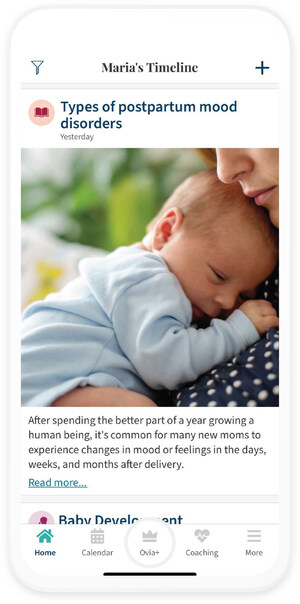Ovia Health Presents Clinical Findings at ACOG and Population Association of America Conferences
Research Initiatives Aim to Reduce C-Section Rate and Uncover Link Between Socioeconomic Status and Time to Conceive
BOSTON, April 30, 2018 /PRNewswire/ -- Ovia Health, the leading women's health and technology company transforming the way employers support women and families along their parenthood journey, presented clinical research focused on combating the U.S. cesarean (C-section) epidemic at the annual meeting of the American College of Obstetrics and Gynecology (ACOG) in Austin, Texas.
The C-section rate in the U.S. has increased 60 percent over the past 15 years, impacting the health of pregnant women as C-sections are associated with increased risk of health issues such as hemorrhage, infection and blood clots. Ovia Health has been working to reduce unnecessary C-sections by helping Ovia Pregnancy users select a delivery hospital based on C-section rates and other quality indicators. As part of this effort, Ovia Health's clinical team reached out to every public health department in the U.S. to gauge their data sharing practices.
Public health departments in each state collect vital statistics data, including information related to births, deaths, marriages and divorces, but this information is not typically shared with the public. This limits patient access to data, which restricts a patient's ability to apply this information to healthcare decision-making processes. Ovia Health's research exposed the vast discrepancies in state data sharing practices and how these practices contribute to the lack of transparency in the U.S. healthcare system. The differences ranged from publicly displaying these data on their website to state laws prohibiting data sharing entirely.
Ovia Health also collaborated on research that was presented by the University of Wisconsin at the annual Population Association of America conference. The research used Ovia Fertility data to uncover the impact of socioeconomic status on the amount of time it takes to conceive.
Combining national demographic datasets and Ovia Fertility data, researchers investigated how geographical factors, such as crime rates, poverty rates and pollution rates, might impact an individual's chance of conception and/or likelihood of experiencing a miscarriage. The researchers concluded that socioeconomic status does have an impact on the amount of time it takes to conceive, and that new forms of data collection such as Ovia Fertility can be used to advance population health.
With one of the largest data sets on women's health in the world, Ovia Health regularly conducts research to improve care for women and families, partnering with established academic and research organizations. For more information on Ovia Health, click here. For more information about Ovia Health's research capabilities, contact [email protected].
Contact: Sarah Coppersmith
[email protected]
SOURCE Ovia Health
Related Links
WANT YOUR COMPANY'S NEWS FEATURED ON PRNEWSWIRE.COM?
Newsrooms &
Influencers
Digital Media
Outlets
Journalists
Opted In






Share this article